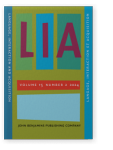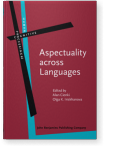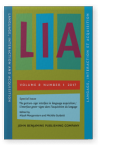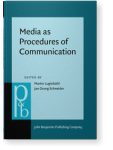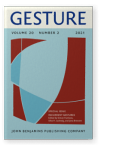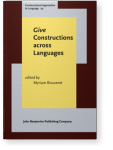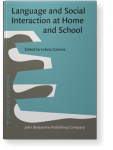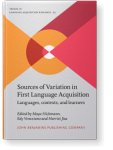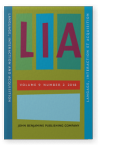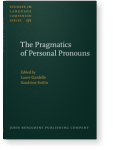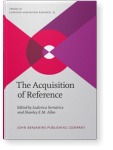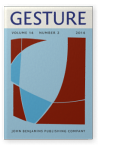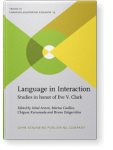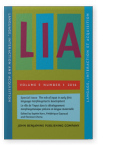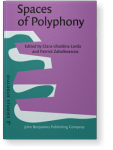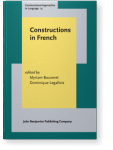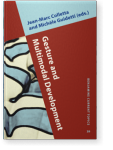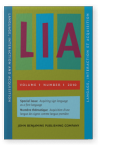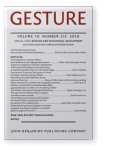Aliyah Morgenstern
List of John Benjamins publications for which Aliyah Morgenstern plays a role.
Journal
Titles
Aspectuality across Languages: Event construal in speech and gesture
Edited by Alan Cienki and Olga K. Iriskhanova
[Human Cognitive Processing, 62] 2018. xviii, 221 pp.
Subjects Cognition and language | Gesture Studies | Semantics | Syntax | Theoretical linguistics
The gesture–sign interface in language acquisition / L’interface geste–signe dans l’acquisition du langage
Edited by Aliyah Morgenstern and Michèle Guidetti
Special issue of Language, Interaction and Acquisition 8:1 (2017) v, 171 pp.
Subjects Cognition and language | Language acquisition | Multilingualism
2024 Chapter 8. The choreography of multimedial procedures and multimodal languaging in French family dinners Media as Procedures of Communication, Luginbühl, Martin and Jan Georg Schneider (eds.), pp. 188–217 | Chapter
In this paper we present a multimodal multimedial approach to multiparty interactions through the analysis of French family dinners in which child and adult participants are engaged in the activities of eating and interacting. The term multimodality is used to refer to the variety of semiotic… read more
2021 French and British children’s shrugs: A cross-linguistic developmental case-study of a recurrent gesture Recurrent Gestures, Harrison, Simon, Silva H. Ladewig and Jana Bressem (eds.), pp. 180–218 | Article
This paper presents a multimodal and form-based approach to language development grounded in situated practices and focuses on the longitudinal analysis of a composite gesture, the shrug, in two datasets of mother-child interactions in French and British English. The shrug in its full-fledged… read more
2021 Chapter 2. Talking about giving: From experience to language in child language Give Constructions across Languages, Bouveret, Myriam (ed.), pp. 55–72 | Chapter
How do children learn to think and talk about giving? Despite the central role such verbs and their associated dative constructions have played in linguistic and developmental theory, relatively few studies have focused on how the linguistic and conceptual underpinnings for giving events are… read more
2021 Chapter 1. Children’s socialization to multi-party interactive practices: Who talks to whom about what in family dinners Language and Social Interaction at Home and School, Caronia, Letizia (ed.), pp. 45–86 | Chapter
Multiparty interactions are crucial situations to study how children can participate in collaborative talk and broaden their experience of various interactional practices. Family dinners are particularly relevant to analyze how children and adults play different participatory roles and how parents… read more
2018 Chapter 16. The blossoming of negation in gesture, sign and oral productions Sources of Variation in First Language Acquisition: Languages, contexts, and learners, Hickmann, Maya †, Edy Veneziano and Harriet Jisa (eds.), pp. 339–364 | Chapter
Negation constructions in longitudinal adult-child data are an excellent source for the study of multimodality in language acquisition. First negative constructions seem to take over from early forms of rejection and avoidance, but tracing the transitions between actions and gestures, and between… read more
2018 L’imparfait dans le langage de l’enfant: Une forme pour sortir de l’ici et maintenant Language, Interaction and Acquisition 9:2, pp. 183–225 | Article
Pour faire référence à des événements passés ou futurs, l’enfant doit parler d’objets et de situations qui ne sont ni visibles ni audibles, mais mémorisées, imaginaires, ou désirées. L’imparfait est l’un des temps grammaticaux qui permet d’exprimer cette « déconnexion » avec l’ici et maintenant.… read more
2017 La négation chez les enfants signeurs et non signeurs: Des patrons gestuels communs The gesture–sign interface in language acquisition / L’interface geste–signe dans l’acquisition du langage, Morgenstern, Aliyah and Michèle Guidetti (eds.), pp. 141–171 | Article
Cet article présente une étude de cas de l’expression de la négation jusqu’à 3 ans chez quatre enfants évoluant dans des environnements langagiers différents : majoritairement monolingue (anglais, français, LSF) ou bilingue (LSF-français), majoritairement unimodal (modalité visuo-gestuelle de la… read more
2017 A functional approach to self-points and self-reference in a deaf signing child and the (dis)continuity issue in child language The gesture–sign interface in language acquisition / L’interface geste–signe dans l’acquisition du langage, Morgenstern, Aliyah and Michèle Guidetti (eds.), pp. 117–140 | Article
Based on her observation of two deaf children acquiring American Sign Language (ASL) who stopped pointing to persons at around 12 months and then produced reversal errors, Petitto (1987) argued that the discontinuous development of gestures and signs gives support to the hypothesis that language… read more
2017 The gesture-sign interface in language acquisition The gesture–sign interface in language acquisition / L’interface geste–signe dans l’acquisition du langage, Morgenstern, Aliyah and Michèle Guidetti (eds.), pp. 1–12 | Introduction
The aim of this special issue is to present and pursue the challenging discussions about the links between gestures and signs and their theoretical and methodological impact that took place during the GDR ADYLOC workshop (GDR CNRS 3195) on April 4–5 2014 at Sorbonne Nouvelle University in Paris.… read more
2015 Chapter 9. First and second person pronouns in two mother-child dyads The Pragmatics of Personal Pronouns, Gardelle, Laure and Sandrine Sorlin (eds.), pp. 173–194 | Article
First and second person pronouns are complex categories for children to acquire. During a transitional period, when they start referring to themselves as subjects, French-speaking children produce a variety of non-conventional forms. The analysis of these uses provide valuable insights on how they… read more
2015 Acquisition and use of pronouns in a dialogic perspective The Acquisition of Reference, Serratrice, Ludovica and Shanley E.M. Allen (eds.), pp. 155–180 | Article
First uses of personal pronouns are characterized by their variability and instability. Since the processes involved in reference to discourse entities and to speech roles do not overlap, the use of pronouns cannot merely be explained by grammatical factors. This chapter considers dialogue as both… read more
2014 A bilingual child’s multimodal path into negation Gesture 14:2, pp. 171–202 | Article
The study of the expression of negation in longitudinal adult-child data is a privileged locus for a multimodal approach to language acquisition. In the case of bilingual language acquisition, the necessity to enter two languages at once might have an influence on the management of the… read more
2014 Shared attention, gaze and pointing gestures in hearing and deaf children Language in Interaction: Studies in honor of Eve V. Clark, Arnon, Inbal, Marisa Casillas, Chigusa Kurumada and Bruno Estigarribia (eds.), pp. 139–156 | Article
This chapter illustrates the richness of pointing and gaze as integral elements of spontaneous oral interactions both in signing and speaking mother-child dyads. These attention-sharing behaviors help infants interpret their caregivers’ productions. The children will then use them as first… read more
2014 « On dit pas Je veux ! »: Apprentissage explicite et implicite du conditionnel dans les interactions adulte–enfant The role of input on early first language morphosyntactic development: Le rôle de l’input sur le développement morphosyntaxique précoce en langue maternelle, Kern, Sophie, Frédérique Gayraud and Florence Chenu (eds.), pp. 19–37 | Article
Because of its syntactic, semantic and cognitive complexity, the French morphology for tense, aspect and modality is acquired slowly and gradually by children, from the moment they are born until their adolescence. The least frequent forms in adult language are acquired later. In order to… read more
2012 Chapter 4. The self as other: Self words and pronominal reversals in language acquisition Spaces of Polyphony, Lorda, Clara Ubaldina and Patrick Zabalbeascoa (eds.), pp. 57–72 | Chapter
The study of reversals may shed some light on the problems children encounter when they try to use the formal, linguistic marks to convey the distinction between the self and the non-self. In two longitudinal case studies of French speaking boys age 1;08 to 3;03, I investigate how they use… read more
2012 Constructing ‘basic’ verbal constructions: A longitudinal study of the blossoming of constructions with six frequent verbs Constructions in French, Bouveret, Myriam and Dominique Legallois (eds.), pp. 127–154 | Article
In this study, the development of verb constructions in young French speaking children is analyzed by focusing on spontaneous language data from three children of the Paris corpus (Leonard, Madeleine, Théophile) age 1;06 up to 3;06. The focus of the work is on six specific verbs which are quite… read more
2012 From gesture to sign and from gesture to word: Pointing in deaf and hearing children Gesture and Multimodal Development, Colletta, Jean-Marc and Michèle Guidetti (eds.), pp. 49–78 | Article
In this paper, we explore the issue of (dis)continuity between gestures and signs and gestures and words by comparing three longitudinal follow-ups of a hearing monolingual French speaking child, a deaf signing child (LSF), and a hearing bilingual (French-LSF) child. Our study indicates that the… read more
2010 Évaluer les compétences linguistiques des enfants en langue des signes française: Une expérience pionnière Acquiring Sign Language as a First Language / Acquisition d’une langue des signes comme langue première, Sallandre, Marie-Anne and Marion Blondel (eds.), pp. 129–158 | Article
Devant l’absence de test d’évaluation des aptitudes linguistiques en langue des signes française (LSF) des enfants signeurs et les besoins exprimés par les nombreux professionnels et chercheurs concernés, nous avons tenté d’adapter à la LSF un test déjà validé pour une autre langue des signes.… read more
2010 From gesture to sign and from gesture to word: Pointing in deaf and hearing children Gesture and Multimodal Development, Colletta, Jean-Marc and Michèle Guidetti (eds.), pp. 172–202 | Article
In this paper, we explore the issue of (dis)continuity between gestures and signs and gestures and words by comparing three longitudinal follow-ups of a hearing monolingual French speaking child, a deaf signing child (LSF), and a hearing bilingual (French-LSF) child. Our study indicates that the… read more
